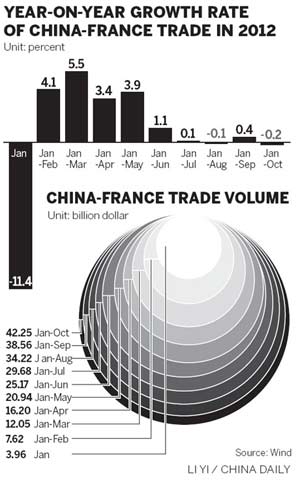France ratings cut 'unlikely to deter' Chinese investment
Updated: 2012-11-22 10:00
By Li Xiang in Paris (China Daily)
|
|||||||||||
A downgrading of France's sovereign debt rating by US rating agency Moody's has heightened fears among investors of troubled times ahead for the country - but analysts said the removal of its top-ranking triple A rating to Aa1 is unlikely to deter future Chinese investment in Europe's second-largest economy.
It was the second rating downgrade France has suffered this year after Standard & Poor's made a similar move in January, stoking market fears that the country could be the next victim of the eurozone debt crisis.

Both agencies now have a negative outlook on France because of its excessive public debt of 90 percent of GDP, its sustained loss of competitiveness, and the diminishing ability of the country to resist future euro-area shocks.
However, analysts said the downgrades and ongoing fears were unlikely to discourage Chinese and other Asian investors from investing in the country, although they suggested it had highlighted the critical structural challenges France is facing.
"If not with their feet, Chinese investors are voting in favor of France with their wallets," said Jean-Francois Di Meglio, president of French think tank Asia Centre in Paris.
"Never before has Chinese investment into Europe been so high, and France remains among the top European destinations.
"Obviously, France's budgetary balances are at stake and we know that it is a difficult struggle to bring back the debt level - but the downgrade only takes stock of old news."
According to a report from accounting firm PricewaterhouseCoopers in France, in 2011 the amount of Chinese investment in Europe for the first time exceeded the amount of investment by European companies in China. Chinese companies invested a total of 11 billion euros ($14.1 billion) in Europe as opposed to 7 billion euros invested by European companies in China.
Helene Rives, head of the China Business Group at PwC in France, said the shift was evidence of a focus toward technological know-how and branded products that can be leveraged by China's rapidly growing middle-class consumer market, which will continue to make France increasingly attractive.
"Chinese investors believe that the continuing uncertainty in the eurozone increases their chances of taking advantage of transactions with European companies that are highly leveraged and previously inaccessible," Rives said.
"They are already being selective and taking the potential risks into account when making investments in France."
But Yan Jufen, chief representative at the China Council for the Promotion of International Trade in France, said that France's high labor costs, and its excessive administrative costs, still remain major obstacles for Chinese investment in the country.
"The Moody's move was anticipated by many investors, and is a result of an accumulation of structural problems that have long existed in France," he said.
Earlier this month, French President Francois Hollande issued a series of measures, including the granting of 20 billion euros in annual tax credits to companies as a way of lowering labor costs, to address the country's declining competitiveness in the global market.
Yan said that the potential labor cost reduction would be too limited to have any substantial effect on the operations of Chinese companies in France.
"But if France can manage to maintain its competitiveness in cutting-edge technology and the value of its consumer brands, it will remain an attractive destination for Chinese investors," he said.
lixiang@chinadaily.com.cn
Related Stories
SOEs urged to invest overseas but avoid haste 2012-11-16 09:58
China's investments in overseas markets to rise 2012-11-15 14:43
Advisory issued to stoke private investment overseas 2012-07-04 11:22
Publishers eager to invest overseas 2012-04-17 10:56
Investing overseas delivers dividends 2011-11-09 09:12
Today's Top News
President Xi confident in recovery from quake
H7N9 update: 104 cases, 21 deaths
Telecom workers restore links
Coal mine blast kills 18 in Jilin
Intl scholarship puts China on the map
More bird flu patients discharged
Gold loses sheen, but still a safe bet
US 'turns blind eye to human rights'
Hot Topics
Lunar probe , China growth forecasts, Emission rules get tougher, China seen through 'colored lens', International board,
Editor's Picks

|

|

|

|

|

|





